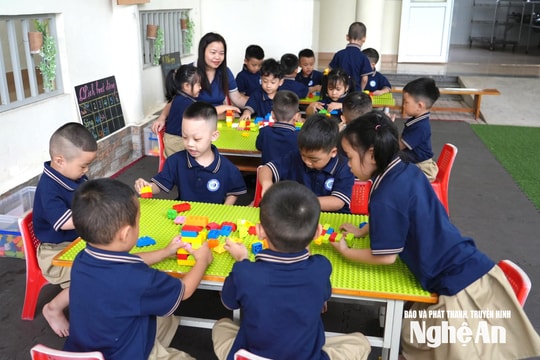Improve the quality of training and fostering political theory
(Baonghean) - In recent times, the work of political theory education (LLCT) in general and training and fostering of LLCT for leaders and managers in particular has been focused on by Party committees and authorities at all levels in the province, leading and directing implementation and achieving positive results.
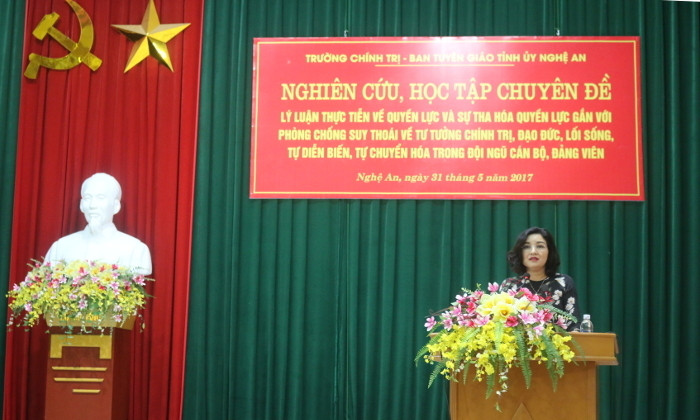 |
| The Provincial Political School deployed a special topic to implement Resolution 4 of the Party Central Committee (12th tenure). Photo: Hoa Hong |
However, the training and development of staff still has some limitations: The planning and coordination of training and development between advisory agencies, management agencies and training facilities are not tight. Although the training and development content and programs have been renewed, they are still duplicated and new knowledge is not updated in a timely manner.
Teaching methods have not yet promoted the activeness of students, lacked appeal and attraction for students to study, training in leadership and management skills is still weak; Forecasting training and development needs is not close to reality. Some agencies and units have not coordinated training and development in accordance with regulations; program content and teaching and learning quality are not guaranteed, not strictly controlled and managed.
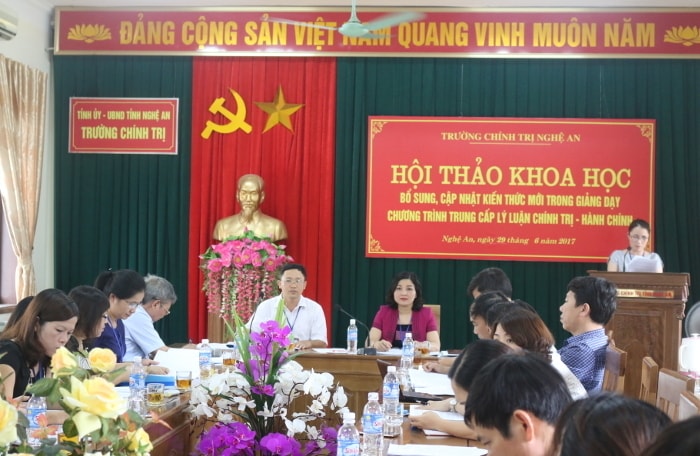 |
| Recently, the Provincial Political School has always paid attention to updating new knowledge in teaching political theory. Photo: Hoa Hong |
The above situation has many causes, but mainly because some party committees, authorities, cadres and party members have not fully recognized the role and importance of training, fostering and building a team of cadres in the current situation, so they have not really paid due attention to training and fostering of political ideology.
Attention to building a team of lecturers, investing in facilities, funding, and policies for training and fostering activities are still limited; inspection and supervision work is not regular; decentralization of training and fostering according to subjects and job title standards is still inadequate. Many cadres have not determined the right motivation for studying, have not strictly fulfilled their study obligations; and are even lazy to study political theory.
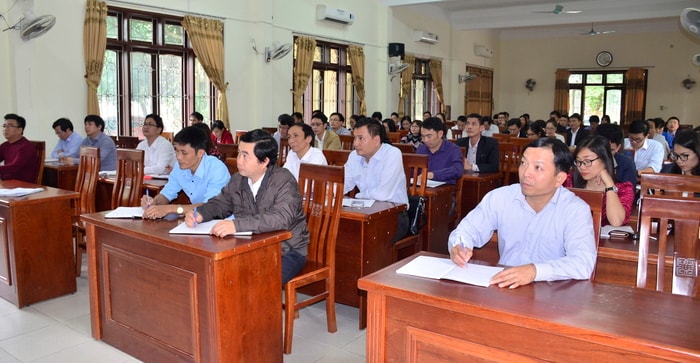 |
| A class at the Provincial Political School. Photo: Thanh Duy |
In order to create a strong change in the quality and effectiveness of training and fostering political ideology for cadres and party members in Nghe An province in the coming time, contributing to effectively preventing and repelling the degradation of political ideology, ethics, lifestyle and manifestations of "self-transformation" and "self-transformation", it is necessary to focus on the following contents:
Firstly, further strengthen the leadership of Party committees and the management of authorities at all levels in the work of training and fostering political ideology. First of all, it is necessary to innovate propaganda, education and dissemination work to renew thinking and raise awareness of Party committees, authorities at all levels and cadres about the goals, requirements, tasks and importance of training and fostering cadres in the period of promoting industrialization, modernization and international integration;
Continue to thoroughly grasp, specifically and effectively implement the documents of the Central, the Government, the Provincial Party Committee and the Provincial People's Committee on training and fostering cadres; raise awareness of responsibility, promote the spirit of learning and self-study of cadres. Must make cadres and party members like to study political theory, actively participate in studying political theory, learning political theory is not only an obligation and responsibility but also an honor of cadres; must soon overcome the disease of laziness in studying political theory.
Party committees and authorities at all levels must develop plans for training and fostering political theory in association with cadre planning, use and arrangement of cadres, in accordance with the requirements of standards for titles and job positions. Selecting and sending cadres to study must ensure the conditions and standards of the subjects, be practical, avoid spreading, causing waste and expense. Political theory training must ensure systematicity and connection between levels and grades; do not accept, mobilize, rotate, promote, appoint, or re-appoint cadres who do not meet the standards for compulsory political theory study.
Second, training and fostering institutions continue to innovate the content, programs, and methods of training and fostering cadres to suit each type of training and cadre title, and evaluate the actual training results. Develop quality and practical training and fostering content and programs; Link basic training with training to improve awareness, practical capacity and leadership and management skills, foster titles; Develop and compile training and fostering programs and materials with a reasonable structure between theory and practice, ensuring standards for titles and job positions; Focus on innovating teaching and learning methods in a positive and modern direction;
Teaching and learning methods must be lively, attractive, practical and suitable for the subject, increase the initiative and positivity of learners, enhance two-way exchange between learners and teachers, make learners love learning, teachers are interested and responsible in teaching; Increase the opening of political theory training classes, skills and professional training classes according to each field, region, in which priority is given to training and fostering cadres in specific regions; Focus on updating new knowledge for leaders, managers, cadres and party members according to the compulsory political theory training program.
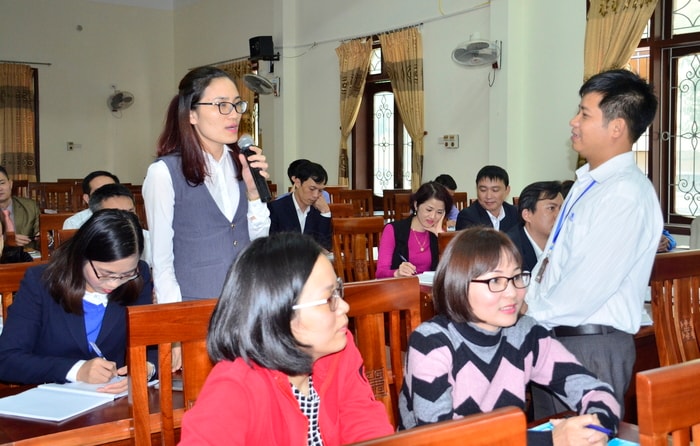 |
| Lecturer and students discuss during a class. Photo: Thanh Duy |
Tuesday,Improve the quality of the staff in charge of training and fostering and the team of lecturers teaching LLCT. Strengthen training and fostering to improve awareness, equip skills and working methods for the staff advising on training and fostering, the team of leaders and managers of training and fostering facilities.
It is necessary to review the regulations according to the functions, tasks, and organizational structure of the units related to the implementation of training and fostering tasks of cadres to develop unified regulations and rules in the direction and management work. Build a team of lecturers with sufficient quantity, ensuring quality, reasonable structure, basic training in expertise, theory, practical knowledge and management experience.
Pay attention to training to improve the qualifications of lecturers to gradually standardize the teaching staff of training and fostering institutions; Build a team of reporters, part-time lecturers, and guest lecturers with qualifications, experience, and responsibility. Have specific policies and mechanisms to invite senior lecturers, reporters, and prestigious and experienced experts to participate in training and fostering programs for political science.
Fourth, increase investment and build facilities for training and development of staff. Increase investment in facilities, working equipment, and means for teaching and learning in a synchronous and modern direction at training and development facilities to meet the requirements of innovation in teaching methods.
Continue to review, revise, supplement, and promulgate new mechanisms and policies on training and fostering, paying attention to policies for lecturers and learners, meeting requirements in the new period, in accordance with the actual situation and budget capacity of the province.
Nguyen Thi Hong Hoa
(Member of the Provincial Party Committee, Principal of the Provincial Political School)

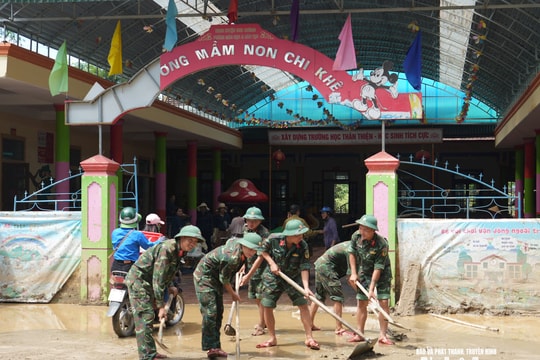
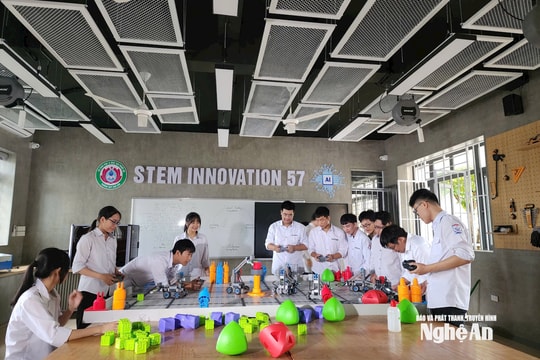
.jpg)
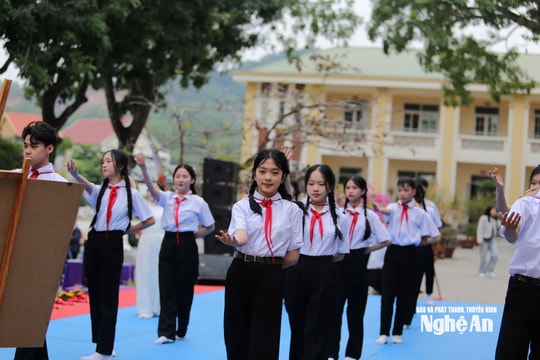
.jpg)
